MARTIALFORCE.COM
PRESENTS
AN INTERVIEW WITH
MUHAMMAD A. RAHMAN, KYOSHI
Formerly
DONNIE COLLINS
AUGUST / 2011

My name is Eddie Morales and welcome to Martialforce.com Online Martial Arts Magazine. The person on this interview comes from a time of old school hardcore fighting Karate. His dedication and passion for knowledge is unequivocally part of his being, as it is not what he does but who he is. Anyone that has ever faced him in the fighting arena can attest to his focus, skill and tenacity. He comes from a time when one thousand kicks and punches were a warm up before the actual training session began. In this interview we will cover his life, beliefs and continued dedicated practice of the arts he loves. I introduce to you Muhammad A. Rahman which most of you from his era will know as Donnie Collins. We hope you enjoy this interview.
Interview by Eddie Morales
Martialforce.com
Online Magazine

Martialforce.com: Where are you originally from and in what area did you grow up?
MUHAMMAD A. RAHMAN: I was born in Manhattan and raise in the Brooklyn Flatbush area.
Martialforce.com: What is your current occupation?
MUHAMMAD A. RAHMAN: Direct support assistance, I work in a hospital for the people with mental retardation.
Martialforce.com: When did you begin Martial Arts and who was your instructor/s?
MUHAMMAD A. RAHMAN: I started martial arts in a school called Jerome Mackeys back in the late 1960s there I studied under Toyotoro Miyazaki.

Martialforce.com: What was the training like back when you started?
MUHAMMAD A. RAHMAN: It was very hard and very powerful and I learned so much from each class. I would take three one hour classes each night three times a week. Then I would go home and put on another gi and take what I learned and see how I can make it work in a fight.
Martialforce.com: What was your black belt test like?
MUHAMMAD A. RAHMAN: I first had to demonstrate all the katas, I also had to show proficiency with the Bo and after that I demonstrated the Bo kata without the Bo, then I had to demonstrate the Sai kata. After that I sparred about ten people in a circle, I laid all of them down (hard). I then had to fight three people and I knock one of them out, then I fought two and almost knock one of them out.
Martialforce.com: Whatís your connection with Michael Jay Jackson and Billy Beason who were both prominent fight competitors?
MUHAMMAD A. RAHMAN: Back in the early 1970's I use to teach for a martial art school named Jerome Mackeys. One day these guys joined the class one was slim and tall (Michael Jay Jackson) the other one was shorter with a lot of guts (Billy Beason). My teacher at that time was Toyotoro Miyazaki and he had put me in charge of teaching them the basics. I became close to them and I love the way they would learn so easy. Michael Jay Jackson was so flexible and had amazing kicks and Billy with his aggressiveness showed definite signs that one day he would become a champion. As far as Michael he was so fast and so loose I knew that one day he would become a problem to the one who stood in his way to stardom. He was so fast. To watch them fight was like seeing myself in action. Unfortunately they had to leave the class because of some problems the school was having. I did not see them again until I met Michael in a tournament and he was my opponent. We fought with the utmost respect for each other. He respected me as one of his first teachers, and I respected him as one of my students that was destined to become what did. 1- a great fighter and 2- the champion that he is. I am proud to have had been able to teach these two men and most of all have them as a friends. I would to also say that I am proud of them and hope to see them again inshallah (if Allah will).
Martialforce.com: You were an avid competitor; can you name some of the toughest fighters you went up against?
MUHAMMAD A. RAHMAN: I fought a lot of people whose name I didn't know because I just wanted to fight so the name did not mean a thing to me. But of the ones I can remember are, Michael (lookup) Sledge, Abdul Mutakabir, Jose Jordan, Errol Bennett, William Oliver and Michael Husband and Michael Jay Jackson.



Muhammad wins a tournament in Brooklyn New York
with a jump kick circa 1970ís

Muhammad fighting while Miyazaki watches on the right
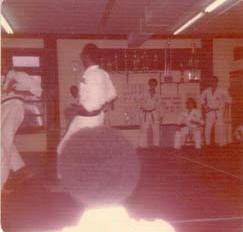



Martialforce.com: Back in the 1980ís you were considered as a fighter to be reckoned with but you seemingly disappeared from competition, what happened?
MUHAMMAD A. RAHMAN: In the late 1970's I became a Muslim and it was about that time in the mid 1980's that I got deeper into the religion, and that pulled me out of the tournament circuit.
Martialforce.com: You were well established as a fighter under the name Donnie Collins. My question is, why did you change your name?
MUHAMMAD A. RAHMAN: I wanted a name that reflected my religion.
Martialforce.com: What does the Muslim religion mean to you and what has it done for you?
MUHAMMAD A. RAHMAN: Islam means submission to the will of God ( Allah). When one does this submission he becomes a muslim.By doing this submission I came to know what my purpose is in this world, and the reason I will born in the world.
وَمَا خَلَقْتُ الْجِنَّ وَالْإِنسَ إِلَّا لِيَعْبُدُونِ
I (Allah) created not the jinns and humans except they should worship Me (Alone).
Quran 51:56
The purpose was that Allah be known, and the reason was to worship Him.
Not to be a martial artist or a champion or the work I do or any other reason except to worship Allah.
Now I'm not saying that there is anything wrong with being a martial artist or being a champion I'm just saying that was not the reason that we were created.
When one does this submission one comes to know oneself. So I could not get angry and hit a man in his face simply because I got angry. Now I know that I will have to stand accountable for my actions in this world.
It made me a better person, it also made me aware of my responsibility
In this world. Islam made me know how to care for my life as well as my fellow man.
It taught me how to pray and to whom I should direct my prayer to.


Muhammad (Collins) at the S.Henry Choís 12th all American Championship
Going through his opponents like the grim reaper
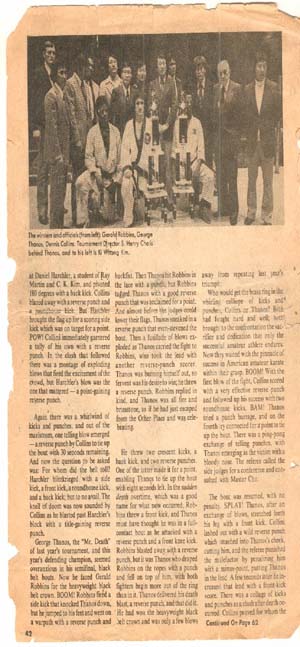
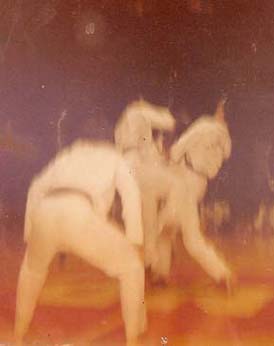
Martialforce.com: In regards to competition, what were some of your winning techniques?
MUHAMMAD A. RAHMAN: I don't have to mention the reverse punch, which is what I was known for. I like to throw techniques coming from the opposite direction, which made my opponent think that I am coming from. So the wheel kick from the front leg, and the roundhouse kick followed by a wheel kick.
Martialforce.com: Do you have any students that competed with the same success as yourself?
MUHAMMAD A. RAHMAN: I have one of my sons that is undefeated but had to stop to go to college. One of my students, (Shakeel Miah) won all but one of his tournaments and the one he lost was because he got hit in the face and he couldn't do some of things I did back in the day, Like hit back in the face, and or knockout my opponent. I was drawing out of the Circuit because I couldnít fight the way I trained. What the people did to you made you want to hurt them, so I left.
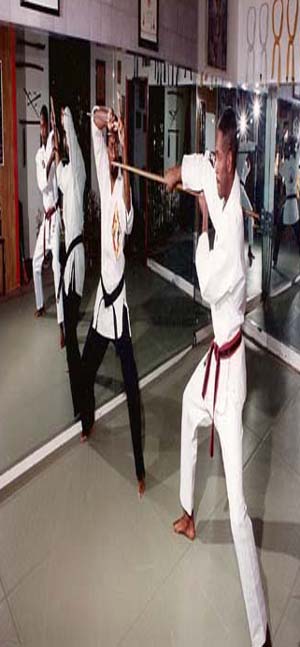
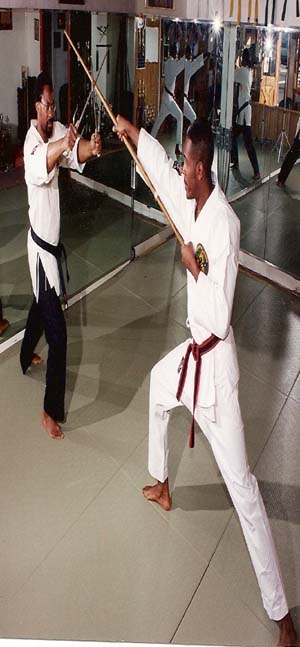
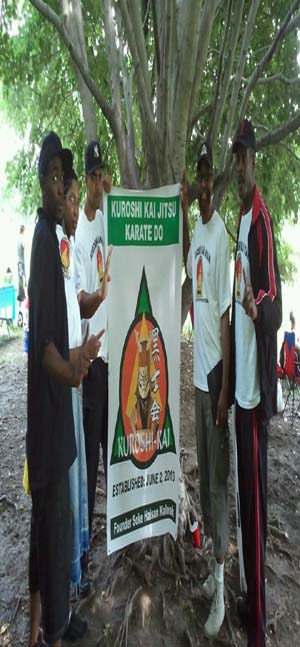
Martialforce.com: How did your training with Soke Haisan Kaleak come about?
MUHAMMAD A. RAHMAN: Well I use see him in the tournaments working magic with the Bo. Iíve never saw no one work the stick like he did. And I wanted to learn how to do it. So I started in his Bo class and he and I became very close. I would go down and train with him in his ju jitsu class and from then on I just became one of his student until the present. I just received my 7th degree with Soke Haisan Kaleak, Kuroshi Kai Jitsu and I feel like he still has so much that I want learn.
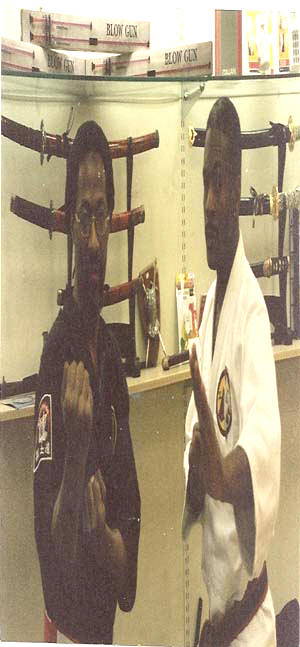
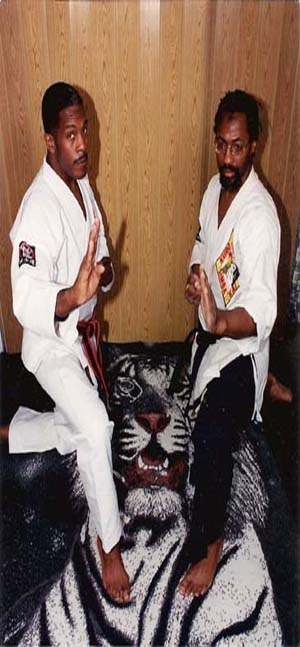
Martialforce.com: Do you think that tradition is important and if yes or no, Why or why not?
MUHAMMAD A. RAHMAN: Yes, I think tradition is important - First of all it is a rebellious student that would want to break the tradition. When a teacher teaches a student what he is actually doing is handing something that was handed down to him. Something that someone before him cherished and you the student are trusted with something that is to be handed down. If you learn something new there is nothing wrong with that, but as for the tradition when you hand it down you should let the one that you are trusting with the tradition know that it is a trust and what you learn besides or what comes from your experience is exactly that (besides your experience). I taught my three sons the traditional Shotokan and I taught them what came from my experience. They have what I trusted them with and more. Now they can pass it on to their children the way that I got it and what can come from their experience as well as mine. Losing the tradition is like getting lost.
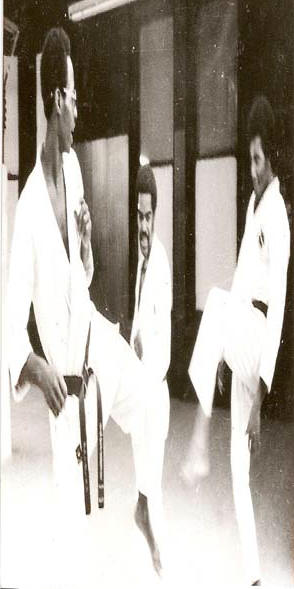
At Jerome Mackeyís Dojo, 1970ís
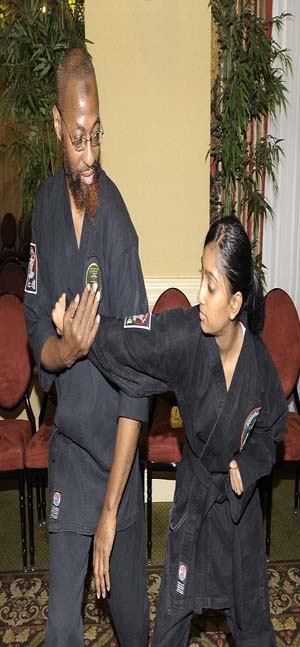
Martialforce.com: What are your thoughts on the respect factor in dojos these days?
MUHAMMAD A. RAHMAN: I Think that the respect level has disappeared, it seems to me that the student dosen't know how to have to respect for the teachers. The teachers don't know how to teach respect anymore. In these days in regards to tournament competition the teachers would cheating for their students, yelling at them like they don't have any sense. Back when I was coming up I remember my teachers ( Toyotoro MIyazaki & Masakasu Takahashi )would walk around with a stick and believe me they did not do a lot of yelling.
In tournaments if you talk back to the judge it was like disrespecting the teacher and the whole school, which that was not tolerated.
I remember our Dojo class was so big that we would have to stand in a position for what seemed like a long time while sensei would correct the white belts down on the other end of the line. I would get out of the position we were in and (bang) I got hit with a stick. I always wondered how he could see me from where he was down there working with the other students but he did and I paid for moving out of the position.
As for the students, I never saw a student talk back to the teacher the way I see the students do now. Even now to this day we don't back talk to Mr Miyazaki. The respect that he taught us shows now that we are the teachers. I am still learning from him and I give the utmost respect like he taught me. Our students know the same respect for us their teachers and even more for my teachers.
So respect is one of the elements that is missing in these schools today. There are some schools that try to hold the it, but how do you teach a old dog new tricks. If a person did not come up with respect then trying to teach them respect is disrespect in itself. I remember that when we lost a fight we would shake our opponent's hand now the student has to be told to shake his opponent's hand. Respect is one of the elements that was lost and one of the hardest to get back.
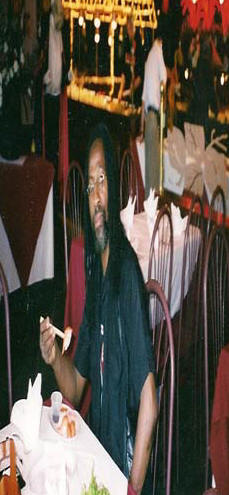
Martialforce.com: What do you see as the difference in tournament in regards to today and when you competed?
MUHAMMAD A. RAHMAN: When I competed there was no such thing as safety equipment I mean we really went after each other. At that time the teachers did not cheat for his student. Teachers could referee for their students and the other guy did not have to fear that he was going to be cheated
The students respected the other teachers and the teachers respected the student.Even the trophies were made better, the price of the tournament was much cheaper and the people use to stay to see the Black Belts fight. Now the tournament last so long that no one wants to stay to see the Black Belts fight.
Back in those days you were guaranteed to fight at least ten to fifth teen times to get into the finals, but in some tournaments now you just have to show up and you are the only one in the division that automatic first place. I don't remember that ever happening back in the day. Over all tournaments were better when they were ran by the orientals. There is so much different between then and now that I just don't have the time to talk about it.
Martialforce.com: In regards to your teaching, what is your main focus on?
MUHAMMAD A. RAHMAN: The focus is on the understanding of the fight. To understand how the body reacts the 1- the force of the blow and 2- the blow itself. I like my students to understand that they are in control of the fight therefore they can manipulate their opponent. In any war there are rules to follow. Your rules are for you and not for your opponent. He more than likely has his own rules, and there are concepts like (a thinking man is a dead man, which means your movements must become second nature without thought or another rule which is if a man that can't stand can't fight) and others.
When you follow the rules and concepts that you practice then the fight seems to slow down and you will be able to control your any situation or the outcome. If you know that a thinking man is a dead man then your opponent is not thinking then you know your job it is to make him think and then take him out. If your opponent has a bad stance, his knee is not properly bent or is facing another direction then forward than that knee is vulnerable, if your opponent loses his footing and is not standing in a ferm stance why fight him just take his feet from under him. Some people focus on just winning and they are the ones that when they lose they argue. They have not yet learned the opposite of winning so their fight is incomplete. Like everything else fighting has a inner and a outer. The inner is the calm with ones self and outer is the kick, punch, and block
And in these days that's what most people are learning the outer part (kick, punch, and the block).
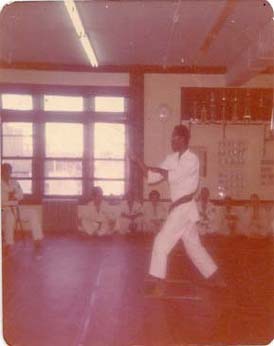
Martialforce.com: What are your thoughts on cross training in regards to other styles of Martial Arts?
MUHAMMAD A. RAHMAN: I am a student and as such I am always learning as for cross training if one was blessed to do such a thing as cross train then one would understand the benefit. Asking a person that never cross train this question is like asking a person that never tasted honey, how it taste.
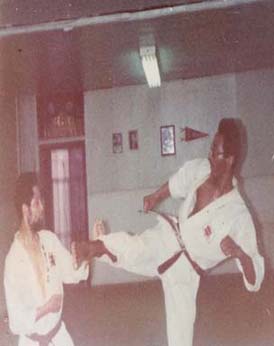
Martialforce.com: Who was your greatest influence growing up in regards to Martial Arts and or life in general?
MUHAMMAD A. RAHMAN: As a kid it was my teacher Mr. Miyazaki. As an adult I would have to say the messenger of Allah. The prophet Muhammad son of Abdullah peace be on him.
Martialforce.com: What would you say is your greatest personal achievement?
MUHAMMAD A. RAHMAN: First becoming a Muslim, then my ability to guild a person to the truth. I'm not just talking religion, but to take a kid off the street and train him in the martial arts and see him become a champion, then see him train someone else. This is a Great achievement.
Martialforce.com: Do you have any long or short-term goals in Martial Arts?
MUHAMMAD A. RAHMAN: My long term goal is to open a school large enough to accommodate the different systems of the Martial Arts, so that I would not have to work for anyone again. In the future I would like to be able to give back to the community and past the tradition to the children so they can carry on the tradition. Also to fulfill the purpose for which I was created.
My short goal to promote the system of kuroshi Kai kan and give to people the chance that was given me. The chance to learn a good system and become a champion, any competitor that competes would love the opportunity to become a champion as I did. Also the disciple, canít forget the disciple which it seems like many schools forgot in these days
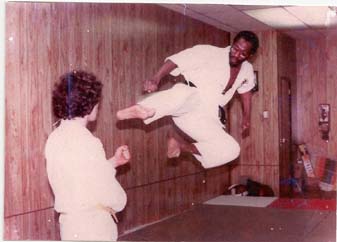
Martialforce.com: What would you say to anyone that wants to start training in regards to its benefits?
MUHAMMAD A. RAHMAN: Go for it, but in these days there are to many people that are teaching and they themselves would not try what they are teaching people to do. There are some good teachers out there teaching, you would have do your homework and find them.
Martialforce.com: If you had your life to live again what would you do differently?
MUHAMMAD A. RAHMAN: Honestly speaking I would become Muslim right of way. I would make sure that I got my degree. Martial Arts is a part of my life that I just couldn't leave out but I would of taken care of doing the other thing first. I feel blessed to have learn from my teachers Toyotoro Miyazki and my close friend and teacher Masaku Takahashi. I am honored to have studied with Soke Haisan Kaleak in KuroshiKai, which I hold a 7th degree Black Belt in. May God bless them all amen.
Thank you for accepting this interview, we here at Martialforce.com wish you much luck in all your future endeavors.